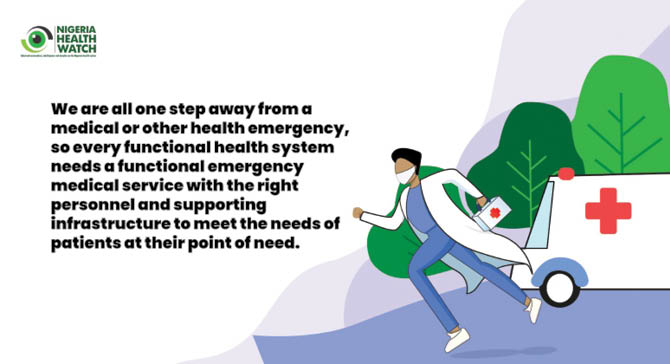In November 2021, a 21-story luxury apartment under construction in Ikoyi, a highbrow area in Lagos State, collapsed. The Lagos State Emergency Management Agency (LASEMA), Lagos State Ambulance Service (LASEMBUS) and good Samaritans were on hand to help clear the rubble and rescue those trapped in the building. Further buildings collapsed in Lagos in 2022 and again the emergency services were called upon.
Disasters – road accidents, floods, fire incidences, collapsed buildings and health emergencies – are regular occurrences and emergency response is expected to be swift and prompt with qualified responders. Unfortunately, emergency response in Nigeria is grossly inadequate.
- Senators who may not return in 2023
- Controversy rages over non-career ambassadors as statutory delegates
According to the Corps Public Education Officer (CPEO), Assistant Corps Marshal (ACM) Bisi Kazeem, the Federal Road Safety Corps (FRSC) recorded 5,320 road traffic crashes between January and June 2021: 2,471 people died, 15,882 sustained injuries, while 15,398 escaped unhurt. With adequate emergency response, the number of casualties would have been significantly lower.
An Emergency Medical Service (EMS) is “a comprehensive system that provides personnel, facilities and equipment for the effective, coordinated and timely delivery of health and safety services to victims of sudden illness or injury”. It provides access to emergency care – care in the community, care enroute, and care upon arrival and at the health care facility – to victims of sudden and life-threatening injuries or emergencies, to prevent needless mortality or long-term morbidity.
Clearly, rapid response emergency services are a must-have for any country, but Nigeria appears to have been considerably slow in attempts to set up an emergency medical service. In 2014, the government approved ‘112’ as Nigeria’s toll-free emergency number for fielding and dispatching distress calls. A number Nigerians could call to get a swift response from health, security, and other services. Call centres came much later and by 2019, 18 call centres were made operational around the country.
In 2016, Nigeria developed a policy on Emergency Medical Services (EMS). Its goal was to coordinate and integrate emergency medical services in Nigeria with the aim of ensuring a systematic implementation of the National Health Act 2014, among other things. The EMS policy should be reviewed every 5 years. Therefore, a review was due in 2021.
On emergency care, the National Health Act stipulates that a healthcare provider, health worker or health establishment shall not refuse a person emergency medical treatment for any reason. The Patient’s Bill of Rights (PBoR) states that “patients must receive urgent, immediate and sufficient intervention and care in the event of an emergency, prioritising such needed attention over other factors, including cost and payment, as well as law enforcement requirements”. Sadly, stories abound of contrary experiences and of patients who die enroute a hospital after being rejected from one. A well-coordinated emergency response service will reduce cases like these to the barest minimum.
In a bid to boost emergency response, government recently launched a new initiative, the National Emergency Medical Service and Ambulance System (NEMSAS). The emergency system will be operated by the Federal Ministry of Health (FMoH) in collaboration with the Federal Road Safety Corps (FRSC), Nigerian Communications Commission (NCC), National Health Insurance Scheme (NHIS), Guild of Medical Directors (GMD) and other private sector partners. The aim is to provide urgent health service to Nigerians at the point of distress, with no cost at the point of care within the first 48 hours.
At the launch of the initiative in February 2022, the Honourable Minister of State for Health, Dr.Olorunnimbe Mamora said, “The programme is part of the continuous effort of the Federal Ministry of Health to respond to unmet needs in life-threatening medical emergencies, from injury and illness across the human life course”. At the time of the launch, NEMSAS had 94 ambulances provided by the Global Fund and the Japanese Government. 70% of the ambulances would operate in the private sector and rural ambulance services like tricycles (Keke) and motorbikes would also be deployed.
The aim is to pilot the initiative in the Federal Capital Territory (FCT). At the FCT NEMSAS Pilot committee meeting in Abuja in March 2022, the committee resolved to reach out to the private sector, set up supportive supervision teams, train paramedics and develop a process flow for reimbursement of claims.
Emergency medical services do not operate in isolation. An EMS is an intricate system with components like Information Technology specialists, call handlers, paramedics, trauma nurses and doctors, communications and ambulance fleet maintenance and other well-trained professionals, that all work together to enhance patient health and safety. To ensure clearly defined objectives, guidelines and responsibilities, the government should consider reviewing the out-of-date policy on Emergency Medical Services (EMS).
We are all one step away from a medical or other health emergency, so every functional health system needs a functional emergency medical service with the right personnel and supporting infrastructure to meet the needs of patients at their point of need.
By Uche Nwagboso, the Communications Manager at Nigeria Health Watch

 Join Daily Trust WhatsApp Community For Quick Access To News and Happenings Around You.
Join Daily Trust WhatsApp Community For Quick Access To News and Happenings Around You.


